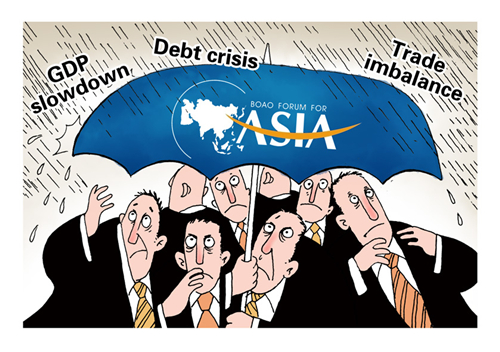India's 'Look East Policy'
 0 Comment(s)
0 Comment(s) Print
Print E-mail People's Daily, April 6, 2012
E-mail People's Daily, April 6, 2012
|
|
|
Braving the storm [By Zhai Haijun/China.org.cn] |
India put forward the "Look East Policy" in the beginning of 1990s and it was considered as an important foreign strategy of India. At that time, led by Treasury Secretary Manmohan Singh, the government of Rao began promoting economic reform, changed Indian development patterns and actively developed the economic relations with foreign countries. Due to the collapse of the Soviet Union, Russia and eastern European countries were beset with a crisis and the cooperation between India and these countries sagged seriously.
In addition, its relations with the neighboring countries were not developing very smoothly; as a result, it was difficult for India to establish international economic cooperation in the South Asia. Under that circumstance, the Southeast Asian countries that flourished in economic development became India’s first chose to develop its foreign economic cooperation because they have deep historical and geopolitics relations with India.
Overall, the focal point of the "Look East Policy" of India at that time was put in economic cooperation. Due to various reasons, India did not positively promote the "Look East Policy" at that time and the Southeast Asian countries had paid their attention to East Asia and underestimated India. Subsequently, the "Look East Policy" did not exert obvious effects.
Since the acceleration of globalization and change of Asian pattern in the 21st century, the "Look East Policy" of India has shown new vitality and rising trend.
India began adopting specific action, transforming to all-round cooperation from exclusive economic exchanges and enlarging its foreign policies from the Southeast Asia to East Asia and Australia.
India strengthened its association with the Southeast Asian countries, joined the treaties of the Association of Southeast Asian Nations, established free trade zone with the Southeast Asian countries and participated in the East Asian cooperative mechanisms and the security forum of the Association of Southeast Asian Nations. The cooperative contents also expend to the military and cultural fields from exclusive economic cooperation.
The "Look East Policy" has become an important part of India's diplomatic strategy.
Is the "Look East Policy" related with the eastward transfer of American strategic focus?
The facts above show India is much earlier in promoting the "Look East Policy" than the eastward transfer of American strategic focus. In order to realize the strategy of eastward transfer, the United States positively encouraged India to participate in the East Asian affairs.
As the strategy of eastward transfer catered to the psychology of India's misgivings and precautions against China, India also manifested its enthusiasm. India lately held a trilateral dialogue with the United States and Japan, and it has also close contacts with Vietnam, Burma and some other Southeast Asian countries.
However, it cannot be deemed as the collaboration of the United States and India. India has been pursuing the independent foreign policy and mainly considers its own interests. It is hard to imagine that India will completely follow the foreign policies of the United States. India has an all-round diplomatic policy and it both maintain relations with the United States and takes much count to the relations with other countries. India always keeps a close contact with Russia, Japan and the European Union countries and its relation with China is also positive.
In the state leaders meeting of the BRICS just closed in New Delhi, India proposed a series of positive proposals, hoping deepening the relations of the BRICS, strengthening cooperative mechanism of these countries and enlarging the role of the international economy and political life of these countries, which again embodies India's all-round diplomatic policy. Therefore, it is groundless to think its “Look East Policy” and the American strategy of eastward transfer are converging.







Go to Forum >>0 Comment(s)